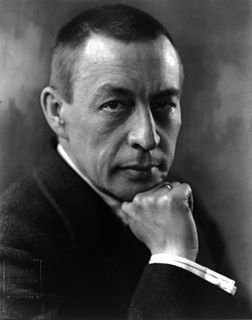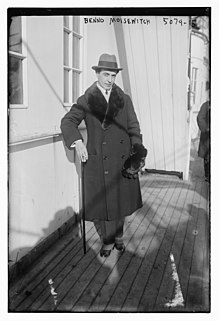Related Research Articles

Sergei Vasilyevich Rachmaninoff was a Russian composer, virtuoso pianist, and conductor of the late Romantic period. The influence of Tchaikovsky, Rimsky-Korsakov, Balakirev, Mussorgsky, and other Russian composers is seen in his early works, later giving way to a personal style notable for song-like melodicism, expressiveness and rich orchestral colours.

The Rhapsody on a Theme of Paganini, Op. 43, is a concertante work written by Sergei Rachmaninoff for piano and orchestra, closely resembling a piano concerto, all in a single movement. Rachmaninoff wrote the work at his summer home, the Villa Senar in Switzerland, according to the score, from 3 July to 18 August 1934. Rachmaninoff himself, a noted interpreter of his own works, played the piano part at the piece's premiere on 7 November 1934, at the Lyric Opera House in Baltimore, Maryland, with the Philadelphia Orchestra conducted by Leopold Stokowski. Rachmaninoff, Stokowski, and the Philadelphia Orchestra made the first recording, on 24 December 1934, at RCA Victor's Trinity Church Studio in Camden, New Jersey. The English premiere on 7 March 1935 at Manchester Free Trade Hall also featured Rachmaninoff with The Hallé under Nikolai Malko.

A piano concerto is a type of concerto, a solo composition in the classical music genre which is composed for a piano player, which is typically accompanied by an orchestra or other large ensemble. Piano concertos are typically virtuoso showpieces which require an advanced level of technique on the instrument, including melodic lines interspersed with rapid scales, arpeggios, chords, complex contrapuntal parts and other challenging material. When piano concertos are performed by a professional concert pianist, a large grand piano is almost always used, as the grand piano has a fuller tone and more projection than an upright piano. Piano concertos are typically written out in music notation, including sheet music for the pianist, orchestra parts for the orchestra members, and a full score for the conductor, who leads the orchestra in the accompaniment of the soloist.

Benno Moiseiwitsch CBE was a Russian-born British pianist.
Katrine Gislinge is a Danish pianist.

Sergei Rachmaninoff's Piano Concerto No. 3 in D minor, Op. 30, was composed in the summer of 1909. The piece was premiered on November 28 of that year in New York City with the composer as soloist. The second performance of the concerto took place on January 16, 1910 and featured Gustav Mahler conducting. The work often has the reputation of being one of the most technically challenging piano concertos in the standard classical piano repertoire.

Caprice No. 24 in A minor is the final caprice of Niccolò Paganini's 24 Caprices, and a famous work for solo violin. The caprice, in the key of A minor, consists of a theme, 11 variations, and a finale. His 24 Caprices were probably composed in 1807, while he was in the service of the Baciocchi court.
Richard Stewart Addinsell was an English composer, best known for film music, primarily his Warsaw Concerto, composed for the 1941 film Dangerous Moonlight.
James Ehnes, is a Canadian concert violinist and violist.

Shura Cherkassky was a Ukrainian-American concert pianist known for his performances of the romantic repertoire. His playing was characterized by a virtuoso technique and singing piano tone. For much of his later life, Cherkassky resided in London.
The Warsaw Concerto is a short work for piano and orchestra by Richard Addinsell, written for the 1941 British film Dangerous Moonlight, which is about the Polish struggle against the 1939 invasion by Nazi Germany. In performance it normally lasts just under ten minutes. The concerto is an example of programme music, representing both the struggle for Warsaw and the romance of the leading characters in the film. It became very popular in Britain during World War II.
Grigory Romanovich Ginzburg was a Russian pianist.
Abbey Henry Simon was an American concert pianist, teacher, and recording artist. He was a protégé of Josef Hofmann at the Curtis Institute of Music and a winner of the Naumburg International Piano Competition in 1940. He was called a "supervirtuoso" by The New York Times.
Adolf or Andrey or Adolf AndreySchulz-Evler was a Polish-born composer.

Eileen Alannah Joyce CMG was an Australian pianist whose career spanned more than 30 years. She lived in England in her adult years.
The arabesque is a type of music which uses melodies to create the atmosphere of Arabic architecture.

Kun-woo Paik is a South Korean pianist. He has performed with multiple orchestras, including the London Symphony Orchestra, the BBC Symphony Orchestra, and the Saint Petersburg Philharmonic.
The 14th International Tchaikovsky Competition for piano was held in Moscow and St. Petersburg, Russia, from June 14 to July 1, 2011, under the auspices of the Russian Federal Government and its Ministry of Culture. It was won by Daniil Trifonov.
The following is a list of the recordings of the pianist György Cziffra.
References
- ↑ Musiclassical.com
- 1 2 3 4 5 6 7 Naxos
- ↑ SIPCA website Archived 29 October 2008 at the Wayback Machine
- ↑ Gramophone
- 1 2 Eileen Joyce timeline Archived 18 January 2016 at the Wayback Machine
- ↑ Musical pointers
- ↑ "Bliss discography". Archived from the original on 12 June 2011. Retrieved 4 December 2008.